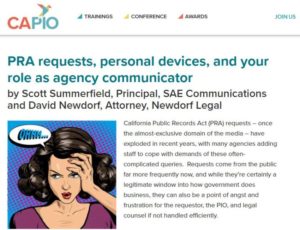 California Public Records Act (PRA) requests – once the almost-exclusive domain of the media – have exploded in recent years, with many agencies adding staff to cope with demands of these often-complicated queries. Requests come from the public far more frequently now, and while they’re certainly a legitimate window into how government does business, they can also be a point of angst and frustration for the requestor, the PIO, and legal counsel if not handled efficiently.
California Public Records Act (PRA) requests – once the almost-exclusive domain of the media – have exploded in recent years, with many agencies adding staff to cope with demands of these often-complicated queries. Requests come from the public far more frequently now, and while they’re certainly a legitimate window into how government does business, they can also be a point of angst and frustration for the requestor, the PIO, and legal counsel if not handled efficiently.
Adding to the challenge is a recent California State Supreme Court decision confirming that public business conducted on personal devices and personal accounts is subject to the PRA. This can be interpreted that any email, text, voicemail, social media post, or other communication that references public business, such as a brewing crisis of confidence, is now subject to PRA requests. While a reference to public business by itself doesn’t convert a private communication to a public record that must be turned over under the PRA, it’s enough to trigger a local agency’s duty to review current and former employees’ and officials’ private accounts for potential public records. And that can be a big problem if your staff and elected officials aren’t diligent about how they communicate, whether they use their own or the agency’s devices and accounts.
SAE brings extensive knowledge of PRA request response from internal and external perspectives, and we can help you meet the public’s right to know while anticipating where a high-visibility request may lead.
Read Scott’s article at this link that he co-wrote with attorney David Newdorf who provides legal counsel to a variety of public agencies and is a former City of San Francisco Deputy City Attorney and former Contra Costa Times reporter.